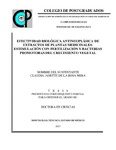| dc.contributor.author | Rosa Mera, Claudia Janette de la | |
| dc.creator | DE LA ROSA MERA, CLAUDIA YANETTE;229763 | |
| dc.date.accessioned | 2019-09-30T14:47:58Z | |
| dc.date.available | 2019-09-30T14:47:58Z | |
| dc.date.issued | 2017-01 | |
| dc.identifier.uri | http://hdl.handle.net/10521/4186 | |
| dc.description | Tesis (Doctorado en Ciencias, especialista en Edafología).- Colegio de Postgraduados, 2017. | es_MX |
| dc.description.abstract | Este estudio evaluó la efectividad biológica de extractos antineoplásicos de Catharanthus roseus (L.) G. Don., y Calendula officinalis L., sometidas a dos tipos de fertilización, y a la inoculación de bacterias promotoras del crecimiento vegetal (BPCV). La primera fase evaluó el efecto de la fertilización orgánica (Floranid® Master Extra, NPK 19-5-10) e inorgánica (NH4NO3), en el crecimiento vegetal. La elección del fertilizante nitrogenado mejora el crecimiento de las plantas; C. roseus respondió significativamente a la fertilización orgánica (100%), mientras que la fertilización inorgánica con NH4NO3 (16 Mm) favoreció a C. officinalis. La segunda fase valoró el efecto de cinco BPCV y su combinación, en el crecimiento de las dos plantas medicinales. Las BPCV mostraron efectos diferenciales en las plantas; destacando Pseudomonas sp. La tercera fase evaluó el efecto citotóxico de extractos metanólicos de las dos plantas medicinales con Pseudomonas sp., y fertilizadas, en tres líneas celulares (HeLa, Vero y J774A.1). El fertilizante orgánico en C. roseus resultó en un extracto antineoplásico con alta citotoxicidad en células cancerosas, pero sin dañar células epiteliales y macrófagos. Para C. officinalis, la fertilización inorgánica combinada con Pseudomonas sp., produjo un extracto citotóxico en células cancerosas, sin dañar células epiteliales ni macrófagos. La cuarta fase evaluó la fertilización orgánica y la inoculación bacteriana en la expresión de genes ORCA3, D4H, STR y TDC (ruta de los terpenoides indol-alcaloides) en C. roseus; la fertilización orgánica aumentó la expresión de los cuatro genes. _______________ ANTINEOPLASIC BIOLOGICAL EFFECTIVENESS OF MEDICINAL PLANT EXTRACTS: ESTIMULATION WITH FERTILIZATION AND PLANT GROWTH PROMOTING RHIZOBACTERIA. ABSTRACT: This study evaluated the biological effectivity of antineoplasic extracts from Catharanthus roseus (L.) G. Don., and Calendula officinalis L., subjected to two types of fertilization and the inoculation of plant growth promoting rhizobacteria (PGPR). First stage evaluated the effects of organic (Floranid® Master Extra, NPK 19-5-10) or inorganic fertilization (NH4NO3), on plant growth. The selection of nitrogen fertilizer improves plant growth; C. roseus significantly responds to organic fertilization (100%), whereas inorganic fertilization with NH4NO3 (16 Mm) favored C. officinalis. Second stage evaluated the effect of five PGPR and their combination on the growth of both plants. The PGPR had differential effects on plants, highlighting Pseudomonas sp. Third stage evaluated the cytotoxic effect of methanolic extracts of both medicinal plants either inoculated with Pseudomonas sp. or fertilized, on three cell lines (HeLa, Vero, and J774A.1). Organic fertilizer in C. roseus resulted in an extract with high cytotoxicity on cancer cells, but without damages on epithelial cells nor macrophages. For C. officinalis, inorganic fertilization combined with Pseudomonas sp., resulted in a cytotoxic extract to cancer cells without affecting epithelial cells or macrophages. Four stage evaluated the effect of organic fertilization and bacterial inoculation on the expression of four genes (ORCA3, D4H, STR and TDC; terpenoid indole alkaloid pathway) in C. roseus; organic fertilization increased the expression of target genes. | es_MX |
| dc.description.sponsorship | Consejo Nacional de Ciencia y Tecnología (CONACyT). | es_MX |
| dc.format | pdf | es_MX |
| dc.language.iso | spa | es_MX |
| dc.rights.uri | http://creativecommons.org/licenses/by-nc/4.0 | es_MX |
| dc.subject | Cáncer | es_MX |
| dc.subject | Vinca | es_MX |
| dc.subject | Caléndula | es_MX |
| dc.subject | Alcaloides | es_MX |
| dc.subject | Líneas celulares | es_MX |
| dc.subject | Pseudomonas | es_MX |
| dc.subject | Cancer | es_MX |
| dc.subject | Calendula | es_MX |
| dc.subject | Alkaloids | es_MX |
| dc.subject | Cell lines | es_MX |
| dc.subject | Edafología | es_MX |
| dc.subject | Doctorado | es_MX |
| dc.subject.classification | CIENCIAS FÍSICO MATEMÁTICAS Y CIENCIAS DE LA TIERRA::CIENCIAS DE LA TIERRA Y DEL ESPACIO::CIENCIAS DEL SUELO (EDAFOLOGÍA)::FERTILIDAD DEL SUELO | es_MX |
| dc.title | Efectividad biológica antineoplásica de extractos de plantas medicinales: estimulación con fertilización y bacterias promotoras del crecimiento vegetal. | es_MX |
| dc.type | Tesis | es_MX |
| Tesis.contributor.advisor | Alarcón, Alejandro | |
| Tesis.contributor.advisor | Ferrera Cerrato, Ronald | |
| Tesis.contributor.advisor | Ramos Ligonio, Ángel | |
| Tesis.contributor.advisor | Gómez Merino, Fernando Carlos | |
| Tesis.contributor.advisor | García Barradas, Oscar | |
| Tesis.contributor.advisor | Mendoza López, Ma. Remedios | |
| Tesis.date.submitted | 2017-01 | |
| Tesis.date.accesioned | 2019 | |
| Tesis.date.available | 2019 | |
| Tesis.format.mimetype | pdf | es_MX |
| Tesis.format.extent | 2,158 KB | es_MX |
| Tesis.subject.nal | Catharanthus roseus | es_MX |
| Tesis.subject.nal | Calendula officinalis | es_MX |
| Tesis.subject.nal | Rizobacteria promotora del crecimiento vegetal | es_MX |
| Tesis.subject.nal | Plant growth-promoting rhizobacteria | es_MX |
| Tesis.subject.nal | Fertilización (reproducción) | es_MX |
| Tesis.subject.nal | Fertilization (reproduction) | es_MX |
| Tesis.subject.nal | Fertilizantes de nitrógeno | es_MX |
| Tesis.subject.nal | Nitrogen fertilizers | es_MX |
| Tesis.rights | Acceso abierto | es_MX |
| Articulos.subject.classification | Plantas medicinales | es_MX |
| dc.type.conacyt | doctoralThesis | es_MX |
| dc.identificator | 1||25||2511||310313 | es_MX |
| dc.contributor.director | ALARCÓN, ALEJANDRO;207404 | |
| dc.audience | generalPublic | es_MX |


